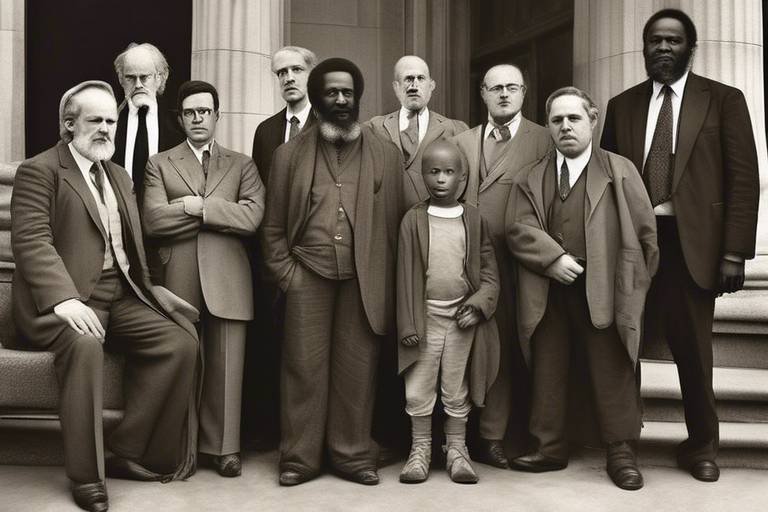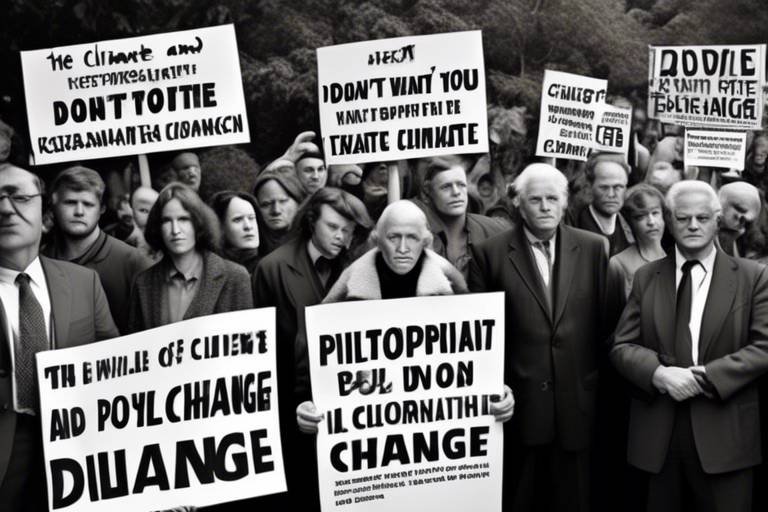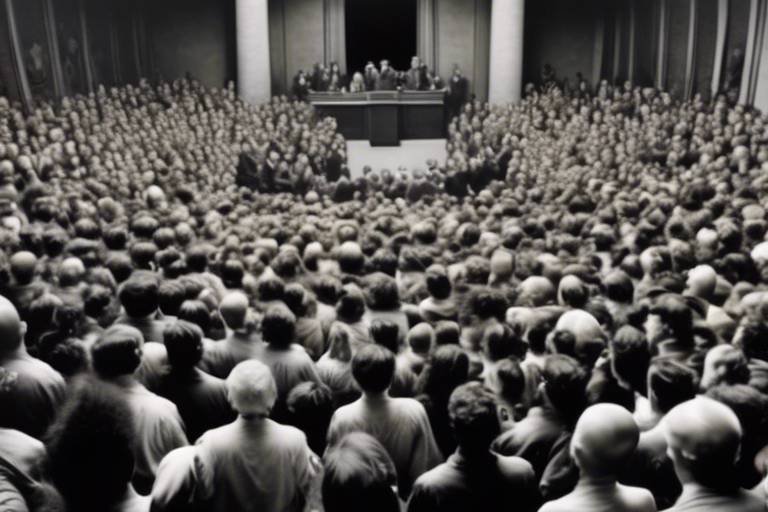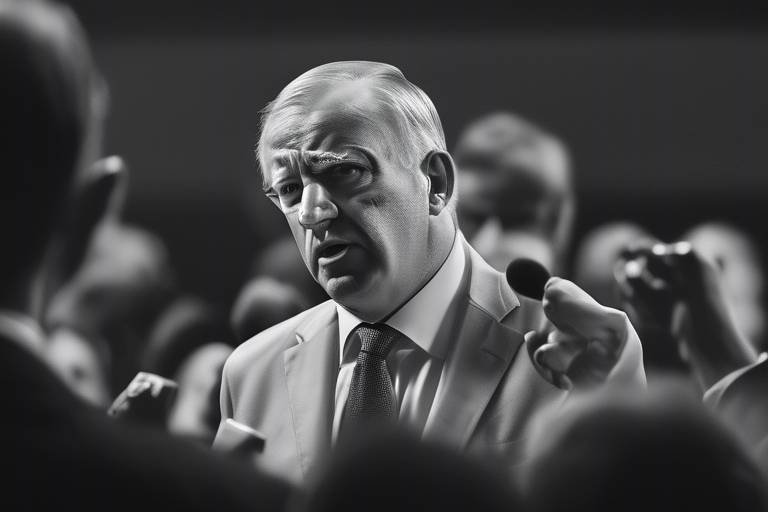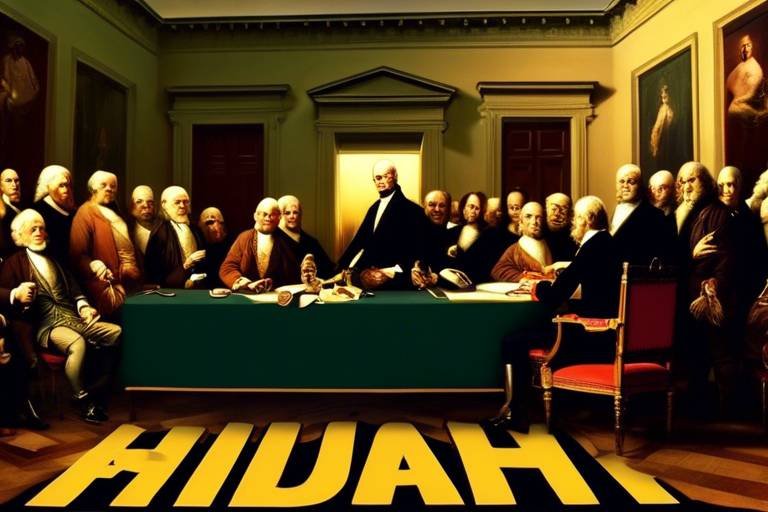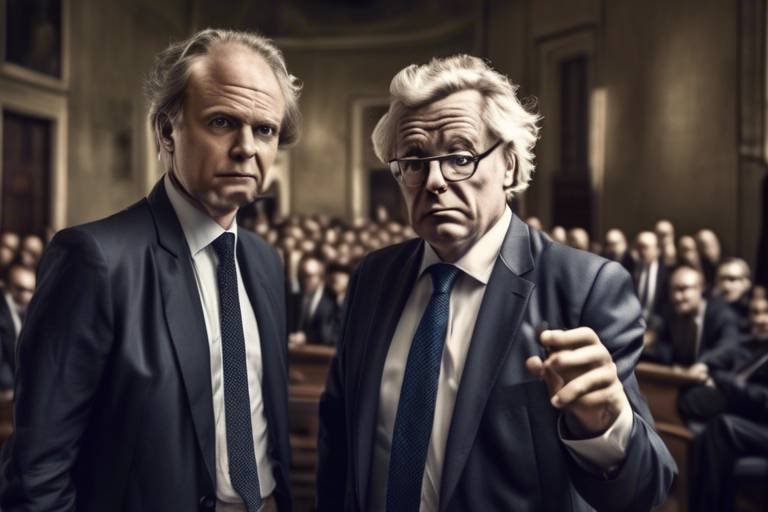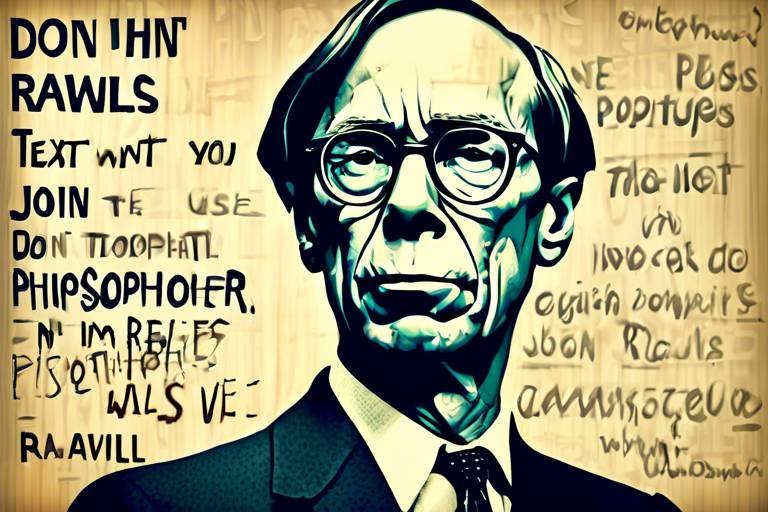Philosophy and the Roots of Liberal Politics
The world of politics can often feel like a complex web of ideas, beliefs, and historical events, but at its core, the roots of liberal politics are deeply intertwined with philosophical thought. This article embarks on a journey through the ages, examining how philosophy has shaped the principles of liberalism, influencing not only political systems but also the very fabric of society. Have you ever wondered how concepts like individual rights and democracy emerged? It's fascinating to see how these ideas evolved, driven by thinkers who dared to challenge the status quo.
Philosophy, in its essence, serves as the backbone of liberal politics. It provides the critical framework through which we can understand the significance of freedom, equality, and justice. The evolution of liberal thought can be traced back to the Enlightenment, a period that ignited the flames of reason and individualism. During this time, philosophers began to advocate for the rights of the individual against the tyranny of authority, laying the groundwork for what we now recognize as liberal political theory.
As we delve deeper into the history of liberalism, we encounter key figures whose ideas continue to resonate today. Think about John Locke, whose theories on natural rights and government by consent laid the groundwork for modern democracy. Or consider Jean-Jacques Rousseau, who introduced the concept of the general will, emphasizing the importance of collective decision-making in a democratic society. And let's not forget John Stuart Mill, whose advocacy for liberty and utilitarianism shaped the discourse around personal freedoms.
But liberalism is not without its critiques. Feminist theorists have emerged to challenge traditional liberalism, arguing for the inclusion of women's rights and gender equality within the political framework. They remind us that the fight for freedom and justice is ongoing and must encompass all voices in society. This dialogue is crucial, as it enriches our understanding of what it means to live in a truly liberal society.
Furthermore, the role of civil society cannot be understated in the context of liberal politics. It acts as a vital space for civic engagement, fostering social justice and ensuring government accountability. Non-governmental organizations (NGOs), for instance, play a pivotal role in advocating for human rights and environmental issues, serving as a check on governmental power. Their presence highlights the importance of active citizenship in maintaining a healthy democracy.
At the heart of liberal democracies lies the principle of free speech, a cornerstone that enables open dialogue and debate. Imagine a society where ideas flow freely, where citizens can express their thoughts without fear of retribution. This dynamic is essential for a vibrant political discourse and an informed citizenry, allowing for the continuous evolution of political ideas and practices.
In conclusion, the philosophical foundations of liberal politics are rich and multifaceted. They remind us of the importance of individual rights, collective responsibility, and the ongoing struggle for justice. As we navigate the complexities of contemporary society, understanding these roots can empower us to engage in meaningful discussions about our political landscape. So, what role will you play in this ever-evolving story of liberalism?
- What is liberalism? Liberalism is a political philosophy that emphasizes individual rights, democracy, and the protection of personal freedoms.
- Who are the key philosophers associated with liberalism? Key philosophers include John Locke, Jean-Jacques Rousseau, and John Stuart Mill, each contributing unique ideas to liberal thought.
- How does civil society contribute to liberalism? Civil society fosters civic engagement and social justice, acting as a check on governmental power and promoting accountability.
- Why is free speech important in a liberal democracy? Free speech allows for open dialogue and debate, which are essential for a healthy political discourse and informed citizenry.

The Enlightenment and Liberal Thought
The Enlightenment, often referred to as the Age of Reason, was a transformative period in the 17th and 18th centuries that fundamentally reshaped the way individuals viewed themselves and their relationship with society and government. It was during this time that the seeds of liberal thought were sown, nurturing ideas that emphasized individual rights, rationality, and the importance of democracy. Thinkers of the Enlightenment challenged the traditional authority of monarchies and the church, advocating instead for a society where reason and scientific thought could flourish.
At the heart of Enlightenment philosophy was the belief that human beings are capable of self-governance and should be free to pursue their own paths to happiness. This was a radical shift from the prevailing views of the time, which often placed power in the hands of a select few. Enlightenment thinkers argued that all individuals possess inherent rights that must be protected by the state. This idea of natural rights became a cornerstone of liberal political theory, influencing revolutions and democratic movements across the globe.
Moreover, the Enlightenment emphasized the significance of reason as a tool for understanding the world. Philosophers like Immanuel Kant urged individuals to think for themselves rather than relying on dogma or tradition. This intellectual independence encouraged people to question the status quo, leading to a more engaged and informed citizenry. The Enlightenment's focus on reason also laid the groundwork for the development of scientific methods and critical thinking, which are vital in contemporary political discourse.
In addition to individual rights and reason, the Enlightenment fostered a spirit of democratic participation. The idea that governance should be based on the consent of the governed was revolutionary. It suggested that a legitimate government derives its authority from the people, paving the way for modern democratic systems. This notion is encapsulated in the famous phrase from the Declaration of Independence: "Governments are instituted among Men, deriving their just powers from the consent of the governed." Such principles were not merely theoretical; they inspired real-world changes, leading to the establishment of democratic institutions that prioritize the voice of the people.
As we reflect on the Enlightenment's legacy, it is essential to understand how these ideas continue to resonate today. The principles of liberalism, rooted in Enlightenment thought, advocate for a society where freedom, equality, and justice are paramount. They challenge us to remain vigilant in protecting individual rights and fostering a political environment that encourages participation and dialogue. This ongoing evolution of liberal thought is a testament to the enduring power of the Enlightenment, reminding us that the quest for a just society is both a historical journey and a contemporary challenge.
- What is the Enlightenment? The Enlightenment was an intellectual movement in the 17th and 18th centuries that emphasized reason, individualism, and skepticism of traditional authority.
- How did the Enlightenment influence liberal thought? Enlightenment thinkers promoted ideas of natural rights, democracy, and the importance of reason, which became foundational to liberal political theory.
- Who were some key philosophers of the Enlightenment? Notable philosophers include John Locke, Jean-Jacques Rousseau, and Immanuel Kant, each contributing significantly to liberal thought.

The landscape of liberal political thought is rich and varied, shaped by the insights of several key philosophers whose ideas have laid the groundwork for contemporary liberalism. These thinkers have not only influenced political theory but have also provided frameworks that resonate with the principles of freedom, equality, and justice that we hold dear today. Let’s dive into the contributions of some of the most influential philosophers in the realm of liberalism, starting with John Locke, who is often regarded as the father of liberalism.
John Locke’s theories on natural rights and government by consent are foundational to liberalism. In his seminal work, Two Treatises of Government, Locke posited that individuals inherently possess rights to life, liberty, and property. He argued that the primary role of government is to protect these rights, and that legitimate political power is derived from the consent of the governed. This concept of a social contract, where individuals agree to form a government in exchange for the protection of their rights, is a cornerstone of liberal thought. Locke’s ideas not only influenced the American and French revolutions but also established a framework for modern democratic governance.
Moving forward in history, we encounter Jean-Jacques Rousseau, whose ideas about the general will added a new dimension to liberalism. Rousseau argued that true freedom is achieved through participation in the collective will of the people. In his work, The Social Contract, he emphasized the importance of civic engagement, suggesting that individuals must subordinate their personal interests to the common good. This notion of the general will challenges the individualistic tendencies of earlier liberal thinkers and highlights the necessity of community and social cohesion in a democratic society. Rousseau’s advocacy for collective sovereignty has sparked debates about the balance between individual rights and societal responsibilities.
Another pivotal figure in liberal thought is John Stuart Mill, who championed individual liberty and the principle of utilitarianism. In his influential essay, On Liberty, Mill argued that individuals should be free to pursue their own happiness, as long as their actions do not harm others. He believed that personal liberties are essential for human flourishing and that society benefits when individuals are free to express themselves and explore diverse ideas. Mill’s advocacy for free speech and open discourse is particularly relevant today, as it lays the groundwork for the vibrant debates that characterize liberal democracies. He also emphasized the need to balance individual freedoms with the interests of society, making his contributions crucial to the development of modern liberalism.
These philosophers—Locke, Rousseau, and Mill—represent just a few of the key figures whose ideas have shaped liberal political thought. Their contributions have sparked ongoing discussions about the nature of freedom, the role of government, and the importance of civic engagement. As we continue to navigate the complexities of contemporary society, their philosophies remain relevant, reminding us of the enduring principles of liberalism that advocate for individual rights, social responsibility, and democratic governance.
- What is the main focus of liberalism? Liberalism primarily focuses on individual rights, freedom, and equality, advocating for a government that protects these rights.
- Who are the most influential philosophers in liberalism? Key philosophers include John Locke, Jean-Jacques Rousseau, and John Stuart Mill, each contributing unique ideas that shaped liberal thought.
- How does liberalism address social issues? Liberalism promotes civic engagement and social justice, emphasizing the importance of individual rights while advocating for the collective good.

John Locke, often hailed as the father of liberalism, made monumental contributions that have shaped the foundation of modern political thought. His ideas on natural rights, particularly the rights to life, liberty, and property, are not just philosophical musings but are considered essential pillars in the structure of liberal democracies. Locke argued that individuals are born with these rights and that the primary role of government is to protect them. This notion of inherent rights was revolutionary during the 17th century, challenging the prevailing view that authority came solely from monarchs or divine right.
Locke's concept of the social contract is another cornerstone of liberal thought. He proposed that governments derive their legitimacy from the consent of the governed. This was a radical departure from the idea of absolute monarchy, suggesting that if a government fails to protect its citizens' rights, the people have the right to revolt. This idea resonates powerfully in contemporary discussions about governance and accountability. Locke's influence can be seen in various democratic documents, including the United States Declaration of Independence, which echoes his sentiments about life, liberty, and the pursuit of happiness.
Moreover, Locke's emphasis on individual liberty laid the groundwork for a society where personal freedoms are cherished and protected. He believed that true freedom is not merely the absence of restraint but rather the ability to make choices that enhance one's life. This perspective encourages a vibrant civil society where individuals can engage in various pursuits without undue interference from the state. Through his writings, Locke championed the idea that a government should be a facilitator of freedom rather than a hindrance.
Locke's theories have also sparked debates about the limits of government intervention in personal lives. For example, while he advocated for the protection of property rights, critics argue that this focus can sometimes lead to inequalities and injustices. This ongoing discussion highlights the dynamic nature of liberalism as it adapts to contemporary challenges. The principles Locke established continue to inspire movements advocating for social justice and equality, proving that his influence is as relevant today as it was in the 17th century.
In summary, John Locke's contributions to liberalism are indispensable. His ideas about natural rights, the social contract, and individual liberty have profoundly influenced the development of liberal political theory. As we navigate the complexities of modern governance, Locke's insights remind us of the importance of protecting individual freedoms and ensuring that governmental power is derived from the consent of the governed.
- What are natural rights? Natural rights are fundamental rights that individuals possess inherently, such as the rights to life, liberty, and property.
- How did Locke influence democracy? Locke's ideas about the social contract and government by consent laid the groundwork for democratic principles, emphasizing that governments must protect the rights of individuals.
- What is the social contract? The social contract is a philosophical concept that suggests individuals consent to form a government to protect their rights, and in return, they agree to abide by its laws.
- Why is individual liberty important? Individual liberty is crucial because it allows people to make choices that enhance their lives and fosters a society where diverse opinions and lifestyles can thrive.

When we dive into the world of Jean-Jacques Rousseau, we find ourselves exploring a landscape rich with ideas that challenge the status quo of governance and society. Rousseau, a pivotal figure in the development of liberal thought, introduced the concept of the general will, which serves as a cornerstone of his political philosophy. But what exactly does this mean? In essence, the general will represents the collective will of the people, transcending individual desires to reflect the common good. It's like a symphony where each instrument plays its part, but together they create a harmonious whole.
Rousseau argued that for a society to be truly free, it must be governed by this general will, which requires active participation from its citizens. He believed that individuals should not only have rights but also responsibilities towards their community. This notion of civic engagement is crucial; it suggests that democracy is not just about casting votes but about being an active participant in the political process. Imagine a vibrant community where everyone is not just a spectator but a player on the field, contributing to the game of governance.
One of the most fascinating aspects of Rousseau's idea is how it challenges the notion of individualism prevalent in liberal thought. While individual rights are essential, Rousseau emphasized that true freedom is found in the pursuit of the common good. This perspective can be somewhat paradoxical—how do we balance personal liberties with the needs of the community? Rousseau believed that when individuals act in accordance with the general will, they find their true freedom, as their actions contribute to the collective well-being.
Furthermore, Rousseau's concept of the general will also has implications for the legitimacy of government. He posited that a government is only legitimate if it reflects the general will of the people. This idea raises an intriguing question: how do we ensure that our leaders truly represent the collective interests of society? Rousseau's insights prompt us to think critically about our political systems and the mechanisms in place to hold our leaders accountable.
In the context of modern liberal democracies, Rousseau's vision remains relevant. His emphasis on civic engagement and the common good resonates with contemporary movements advocating for social justice and community involvement. In a world where individualism often takes center stage, Rousseau reminds us of the importance of looking beyond ourselves and considering the broader implications of our actions. As we navigate the complexities of modern governance, his ideas challenge us to find a balance between individual rights and our responsibilities to one another.
- What is the general will? The general will is the collective will of the people that aims for the common good, as proposed by Rousseau.
- How does Rousseau's idea of the general will differ from individualism? While individualism focuses on personal rights, Rousseau emphasizes the importance of the collective good over individual desires.
- Why is civic engagement important according to Rousseau? Civic engagement is crucial as it ensures that citizens actively participate in governance, reflecting the general will and contributing to a free society.
- How does Rousseau's philosophy apply to modern democracies? Rousseau's ideas encourage contemporary societies to balance individual rights with community responsibilities and to ensure that governments reflect the will of the people.

John Stuart Mill, a towering figure in the realm of liberal thought, made profound contributions that resonate even today. His advocacy for liberty isn't just a theoretical framework; it's a clarion call for individual empowerment and societal progress. Mill famously argued that the **freedom of the individual** is paramount, and he believed that society should only intervene in an individual's life to prevent harm to others. This principle, known as the **harm principle**, serves as a cornerstone of his philosophy, emphasizing that personal liberties should be upheld unless they infringe upon the rights of others.
Mill's ideas can be likened to a **double-edged sword**; while he championed personal freedoms, he also acknowledged the importance of societal interests. He argued that true liberty involves not only the absence of restraint but also the presence of opportunities for self-improvement and personal development. In his view, a society that fosters individual creativity and expression is one that thrives. Mill's famous assertion that “over himself, over his own body and mind, the individual is sovereign” underscores his belief in the **sacredness of personal autonomy**.
Moreover, Mill's commitment to **utilitarianism**—the idea that actions are right if they promote happiness—adds a layer of complexity to his advocacy for liberty. He contended that individual freedoms should be balanced with the greater good, suggesting that while one should have the liberty to act as they choose, such actions should not detract from the happiness of the community. This balancing act is crucial in contemporary discussions about **freedom of speech**, where the challenge lies in allowing diverse opinions while maintaining respect for all individuals.
Mill also recognized the role of **education** in promoting liberty. He believed that informed citizens are better equipped to make decisions that benefit themselves and society as a whole. In his view, a well-educated populace is essential for a thriving democracy, as it enables individuals to engage in meaningful discourse and challenge oppressive norms. To Mill, the pursuit of knowledge was not merely an academic endeavor but a fundamental aspect of living a free and fulfilling life.
In summary, John Stuart Mill's advocacy for liberty is a rich tapestry woven from the threads of individual rights, societal responsibility, and the pursuit of happiness. His thoughts continue to inspire debates on personal freedom and social justice, reminding us that the quest for liberty is not just about personal gain but about fostering a community where everyone can thrive. Mill's legacy challenges us to reflect on our own freedoms and the responsibilities that come with them, urging us to ask ourselves: Are we truly free if our actions hinder the freedom of others?
- What is the harm principle? The harm principle, articulated by John Stuart Mill, states that individuals should be free to act however they wish unless their actions cause harm to others.
- How does Mill's utilitarianism relate to liberty? Mill's utilitarianism suggests that individual freedoms should be exercised in a way that promotes the greatest happiness for the greatest number, balancing personal liberty with societal welfare.
- Why is education important in Mill's philosophy? Mill believed that an educated populace is essential for a functioning democracy, as it empowers individuals to make informed decisions and engage in meaningful discussions about their rights and responsibilities.

Feminism has played a transformative role in reshaping liberal political thought, challenging traditional notions of individual rights and advocating for a more inclusive framework that recognizes the importance of gender equality. While classical liberalism has often been critiqued for its male-centric perspectives, feminist theorists have sought to highlight the inadequacies of these frameworks in addressing women's rights and experiences. This critique is not merely about adding women to the existing liberal narrative; it is about fundamentally rethinking the principles that underpin liberalism itself.
At the heart of feminist critiques is the assertion that liberalism, in its traditional form, tends to overlook the systemic inequalities that women face. For instance, the liberal emphasis on individualism often neglects the social contexts that shape women's lives. Feminist theorists argue that without acknowledging the impact of patriarchy and social structures, liberalism fails to provide a truly equitable framework. This perspective advocates for a more nuanced understanding of rights that incorporates both individual liberties and collective responsibilities.
Moreover, feminist perspectives emphasize the necessity of including women’s voices in political discourse. It is not enough to merely advocate for equality; there must also be an active engagement with women's experiences and perspectives in the formation of policies. This is where concepts like intersectionality come into play, recognizing that women do not experience oppression in a vacuum but rather in conjunction with other identities such as race, class, and sexuality. By integrating these diverse experiences into the liberal framework, feminist theorists strive for a more comprehensive understanding of justice and equality.
In the contemporary landscape, feminist liberalism has evolved to address various issues, from reproductive rights to workplace equality. This evolution reflects a broader understanding of what it means to be free and equal in a society that has historically marginalized women. Feminist theorists argue that true liberalism must not only protect individual rights but also actively work to dismantle the barriers that prevent women from fully participating in society.
To illustrate the impact of feminist thought on liberalism, consider the following table that outlines key contributions of feminist theorists to liberal political theory:
| Theorist | Contribution |
|---|---|
| Mary Wollstonecraft | Advocated for women's education and rationality as a means of achieving equality. |
| Simone de Beauvoir | Explored the concept of "the Other" and the social construction of gender, emphasizing the need for women's liberation. |
| Judith Butler | Introduced the idea of gender performativity, challenging fixed notions of gender identity and advocating for fluidity in gender roles. |
In conclusion, feminist perspectives in liberalism are essential for a comprehensive understanding of justice and equality in modern society. By advocating for the inclusion of women's experiences and challenging traditional liberal frameworks, feminist theorists are not only enriching liberal thought but also pushing for a more equitable world. As we continue to explore the intersections of gender and politics, it becomes increasingly clear that the future of liberalism must be inclusive, acknowledging and addressing the diverse realities faced by women across the globe.
- What is feminist liberalism? Feminist liberalism is a branch of political thought that seeks to address and rectify the gender inequalities present in traditional liberal frameworks, advocating for women's rights and inclusion in political discourse.
- How does feminism critique traditional liberalism? Feminism critiques traditional liberalism for its tendency to overlook systemic inequalities and for its male-centric perspectives, arguing for a more inclusive approach that recognizes the complexities of women's experiences.
- Why is gender equality important in liberal politics? Gender equality is crucial in liberal politics as it ensures that all voices are heard and represented, leading to a more just and equitable society where everyone has the opportunity to participate fully in political life.

Civil society is often described as the backbone of liberal democracies, acting as a vital bridge between the government and the individual. It encompasses a wide array of organizations, from non-governmental organizations (NGOs) to community groups and advocacy networks, all of which play a significant role in shaping public discourse and influencing policy. But what exactly does this mean in practice? How does civil society contribute to the democratic process? Let's dive deeper into its multifaceted role.
At its core, civil society fosters civic engagement. This engagement is crucial because it empowers individuals to voice their concerns, participate in decision-making processes, and hold their governments accountable. In a world where political apathy can be rampant, civil society organizations often serve as catalysts, mobilizing citizens to take action on issues that matter to them. Whether it’s organizing a local community meeting or launching a national campaign, civil society breathes life into the democratic ideals of participation and representation.
Moreover, civil society is instrumental in promoting social justice. By advocating for marginalized groups and challenging inequalities, these organizations ensure that the voices of the underrepresented are heard. For instance, NGOs often work tirelessly to address issues such as poverty, discrimination, and environmental degradation. Their efforts not only raise awareness but also push for tangible changes in policies and practices that affect the most vulnerable in society.
Another critical aspect of civil society is its role in ensuring government accountability. Through transparency initiatives, watchdog activities, and public advocacy, civil society organizations can scrutinize government actions and demand accountability. This is essential for maintaining the health of a democracy, as it prevents the abuse of power and corruption. In fact, many successful movements for democratic reform have been spearheaded by civil society actors who have bravely challenged the status quo.
To illustrate the impact of civil society, consider the following table that highlights key functions and examples of civil society organizations:
| Function | Example |
|---|---|
| Advocacy for Human Rights | Amnesty International |
| Environmental Protection | Greenpeace |
| Community Development | Habitat for Humanity |
| Social Justice | American Civil Liberties Union (ACLU) |
It's also important to note that civil society is not without its challenges. In some regions, governments may view these organizations as threats, leading to restrictions on their operations. This suppression can stifle the very essence of democracy, where open dialogue and dissent are crucial for progress. Hence, supporting civil society is not just beneficial; it’s essential for the health of any liberal political system.
In conclusion, civil society plays a multifaceted role in liberal democracies. By fostering civic engagement, promoting social justice, and ensuring government accountability, it acts as a crucial player in the democratic process. As we navigate the complexities of contemporary society, recognizing and supporting the vital contributions of civil society organizations will be key to upholding the principles of liberty and justice for all.
- What is civil society? Civil society refers to the collection of organizations and institutions that operate independently from the government, such as NGOs, community groups, and advocacy networks.
- Why is civil society important in a democracy? Civil society is important because it encourages civic engagement, promotes social justice, and holds governments accountable, thereby enhancing the democratic process.
- How can individuals get involved in civil society? Individuals can get involved by volunteering with local organizations, participating in community events, or advocating for causes they are passionate about.

In the landscape of liberal politics, Non-Governmental Organizations (NGOs) play a pivotal role that cannot be overstated. These entities, which operate independently of government influence, are often the backbone of civil society. They engage in a myriad of activities that address social issues, advocate for human rights, and promote environmental sustainability. Imagine them as the vigilant watchdogs of democracy, ensuring that the voices of the marginalized are heard and that governmental power is kept in check. In this way, NGOs not only enrich the political discourse but also serve as a critical counterbalance to state authority.
One of the most compelling aspects of NGOs is their ability to mobilize citizens around pressing issues. They act as catalysts for change, fostering civic engagement and stimulating public interest in various causes. For instance, organizations focused on environmental conservation often rally communities to participate in initiatives like tree planting or clean-up drives. Such activities not only contribute to ecological sustainability but also strengthen community bonds. It’s akin to planting seeds of activism that grow into a forest of social responsibility.
Moreover, NGOs often serve as a bridge between the government and the populace. They can articulate the needs and concerns of citizens, ensuring that these are reflected in public policy. This role is particularly crucial in situations where government responsiveness is lacking. For example, when a community faces issues such as inadequate healthcare or education, NGOs can step in to advocate for reforms. They gather data, conduct research, and present their findings to policymakers, effectively making the voices of the people resonate within the halls of power. This dynamic interplay is essential for a healthy democracy, as it fosters a culture of accountability and transparency.
To better understand the impact of NGOs on liberal politics, let’s take a look at some key areas where they have made significant contributions:
| Area of Impact | Examples of NGO Activities |
|---|---|
| Human Rights Advocacy | Monitoring abuses, providing legal assistance, and raising awareness. |
| Environmental Protection | Campaigning against pollution, promoting sustainable practices, and conducting research. |
| Social Justice | Advocating for marginalized communities, promoting gender equality, and fighting poverty. |
In conclusion, NGOs embody the spirit of liberalism by empowering citizens and promoting democratic values. They remind us that democracy is not just about the right to vote but also about active participation in societal issues. Without these organizations, the political landscape would be much less vibrant, and the voices of many would remain unheard. So, the next time you see an NGO in action, remember that they are not just organizations; they are the heartbeat of civil society, pulsating with the demands for justice, equality, and sustainability.
- What is the primary role of NGOs in liberal democracies? NGOs advocate for social issues, hold governments accountable, and empower citizens to engage in political processes.
- How do NGOs impact policy-making? They gather data, conduct research, and represent the voices of the community, influencing public policy decisions.
- Can NGOs operate globally? Yes, many NGOs work across borders to address global issues such as climate change, human rights, and poverty.

Free speech is often heralded as the bedrock of liberal democracies. It allows individuals to express their thoughts and opinions without fear of censorship or retaliation. Imagine living in a world where you couldn't voice your ideas or challenge the status quo. Sounds stifling, right? This fundamental right is not just about the ability to speak; it's about fostering an environment where dialogue and debate thrive. In a liberal society, free speech acts as a catalyst for change, driving social progress and innovation.
One of the most compelling aspects of free speech is its role in promoting informed citizenry. When citizens can freely exchange ideas, they become more educated and engaged in the political process. This open dialogue is crucial for the functioning of democracy, as it encourages diverse perspectives and helps to hold those in power accountable. Without free speech, how can we expect to challenge injustices or advocate for reforms? It’s like trying to navigate a ship without a compass; you might end up lost in the storm of misinformation.
Moreover, free speech is essential for social justice movements. History has shown us that many significant changes arise from the voices of those who dare to speak out against oppression. From the civil rights movement to modern-day climate activism, free speech has been the driving force behind societal transformation. It empowers marginalized groups to articulate their experiences and demands, ensuring that their voices are heard in the public sphere. When we stifle these voices, we risk perpetuating inequality and injustice.
However, the concept of free speech is not without its challenges. The rise of hate speech and misinformation poses significant threats to the very fabric of democratic discourse. While it is crucial to protect the right to free expression, we must also grapple with the implications of speech that incites violence or spreads falsehoods. This delicate balance is where the debate often gets heated. How do we protect free speech while also safeguarding our communities from harm? It's a complex issue that requires thoughtful consideration.
In conclusion, the importance of free speech in liberal democracies cannot be overstated. It is the lifeblood of a vibrant society, enabling individuals to challenge, debate, and innovate. As we navigate the complexities of modern communication, we must remain vigilant in defending this right while fostering an environment that promotes respectful and constructive dialogue. After all, a society that values free speech is a society that values its citizens.
- Why is free speech important in a democracy? Free speech is vital because it allows for open dialogue, encourages diverse opinions, and holds the government accountable.
- What are the limits of free speech? While free speech is a fundamental right, it does have limits, especially when it comes to hate speech, incitement to violence, and misinformation.
- How does free speech contribute to social justice? Free speech empowers marginalized voices, allowing them to advocate for their rights and challenge systemic injustices.
Frequently Asked Questions
- What is the main idea behind liberal politics?
Liberal politics centers around the principles of individual rights, freedom, and democracy. It emphasizes the importance of personal liberties and the idea that government should be based on the consent of the governed, ensuring that each person has a voice in the political process.
- How did the Enlightenment influence liberal thought?
The Enlightenment was a transformative period that introduced concepts like reason, individualism, and equality. Thinkers of this era laid the groundwork for modern liberalism by advocating for rights that belong to individuals, which became fundamental to democratic governance.
- Who are some key philosophers associated with liberalism?
Key philosophers include John Locke, who focused on natural rights and government by consent; Jean-Jacques Rousseau, who introduced the concept of the general will; and John Stuart Mill, who emphasized individual liberty and the balance between personal freedoms and societal interests.
- What role does civil society play in liberal democracies?
Civil society is essential in liberal democracies as it promotes civic engagement, social justice, and accountability in governance. It acts as a platform for citizens to express their views, advocate for change, and hold governments accountable for their actions.
- How do NGOs contribute to liberal politics?
Non-Governmental Organizations (NGOs) play a crucial role by advocating for human rights, environmental protection, and social justice. They serve as a check on governmental power, ensuring that the voices of marginalized groups are heard and considered in political decision-making.
- Why is free speech important in liberal democracies?
Free speech is a cornerstone of liberal democracies because it allows for open dialogue and debate. This exchange of ideas is vital for a healthy political discourse, enabling citizens to make informed decisions and hold their leaders accountable.
- How have feminist perspectives influenced liberalism?
Feminist theorists have critiqued traditional liberalism for often overlooking gender equality and women's rights. They advocate for the inclusion of these issues within liberal frameworks, pushing for a more comprehensive understanding of individual rights that encompasses all genders.

